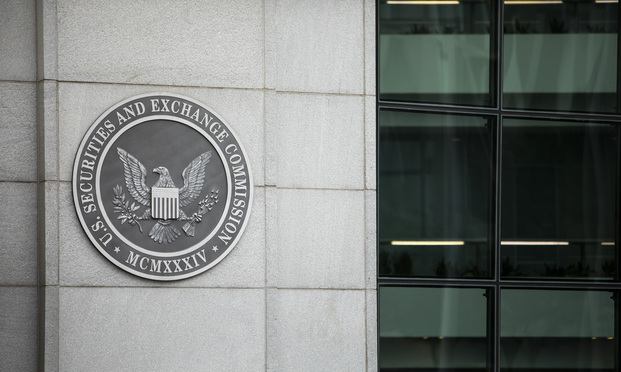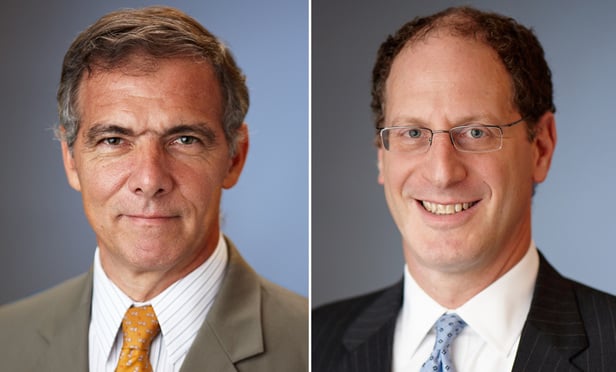Richard F Albert

April 07, 2021 | New York Law Journal
Congress Poised To End Use of Acquitted Conduct at SentencingAmong the many ways the U.S. Sentencing Guidelines have distorted the federal criminal justice system is through heavy reliance on factual determinations typically made by judges at sentencing rather than by juries at trial. Two senators recently announced the introduction of the "Prohibiting Punishment of Acquitted Conduct Act of 2021," which would bar courts from increasing a defendant's sentence based on acquitted conduct. Robert J. Anello and Richard F. Albert provide background and discuss the legislation in this edition of their White-Collar Crime column.
By Robert J. Anello and Richard F. Albert
10 minute read

February 10, 2021 | New York Law Journal
Congress's Signing Bonus for Gensler: New Powers for His SECIn this edition of their White-Collar Crime column, Robert J. Anello and Richard F. Albert explain that regardless of his enforcement priorities, Gary Gensler's SEC will benefit from the expansion of the SEC's powers that Congress included in the National Defense Authorization Act passed on the first day of the new year. In enacting this law, Congress effectively has overridden the SEC's recent stinging Supreme Court defeats.
By Robert J. Anello and Richard F. Albert
9 minute read

December 09, 2020 | New York Law Journal
Days Seem Numbered for Circuit's Controversial Insider Trading DecisionDays before Thanksgiving, the United States Solicitor General's office responded to defendants' petitions for certiorari in 'Blaszczak'. The government agreed that the Supreme Court should vacate the Second Circuit's decision, and suggested a remand for further consideration in light of an intervening decision in 'Kelly v. United States'. The significant issues the certiorari petitions present in two critical areas of white-collar criminal doctrine are worthy of practitioners' attention and are addressed by White-Collar Crime columnists Robert J. Anello and Richard F. Albert.
By Robert J. Anello and Richard F. Albert
13 minute read

October 07, 2020 | New York Law Journal
Implications of a More Conservative Supreme Court for White-Collar PractitionersIn recent years, justices of the Supreme Court have tended to rule differently in white-collar crime cases than how their traditional labels of liberal or conservative would suggest in "blue-collar" crime cases, write White-Collar Crime columnists Robert J. Anello and Richard F. Albert.
By Robert J. Anello and Richard F. Albert
9 minute read

September 14, 2020 | Law.com
FIFA Decision Confirms Long Arm of Honest Services FraudUnited States v. Napout The U.S. government's lead role in the prosecution of corruption within the Zurich-based FIFA may be a paradigmatic example of U.S. law enforcement acting as the world's policeman. If corruption is based on foreign executives violating their duties of loyalty to foreign private entities, how does that translate into a violation of U.S. criminal law? Does it matter that the conduct in which the foreign executive engaged — commercial bribery — may not be illegal under the law of the executive's home country?
By Robert J. Anello and Richard F. Albert
12 minute read

August 12, 2020 | New York Law Journal
FIFA Decision Confirms Long Arm of Honest Services FraudIn their White-Collar Crime column, Robert J. Anello and Richard F. Albert discuss the Second Circuit's decision in 'Napout,' which illustrates that if investigators find use of the U.S. banking system in carrying out a scheme, few practical limits will be placed on U.S. prosecutors' ability to reach alleged misconduct anywhere in the world.
By Robert J. Anello and Richard F. Albert
12 minute read

June 10, 2020 | New York Law Journal
Bridgegate: Open Questions After Supreme Court Narrows Fraud StatutesWhite-Collar Crime columnists Robert J. Anello and Richard F. Albert discuss the Supreme Court's recent reversal of the "Bridgegate"-related convictions and its implications, writing that the extent to which the principles articulated in that decision will have an impact on future federal fraud prosecutions is currently being tested in another high-profile case currently on appeal before the Second Circuit where the "right to control" theory is at issue.
By Robert J. Anello and Richard F. Albert
12 minute read

April 08, 2020 | New York Law Journal
Paying Plea Agreements More Than Lip ServiceWhite-Collar Crime columnists Robert J. Anello and Richard F. Albert discuss an appeal in the well-publicized fraud prosecution of former sports radio personality Craig Carton, which presents the question whether, though purporting to accept the terms of a plea agreement, a prosecutor's advocacy may cross the line into a breach of that agreement.
By Robert J. Anello and Richard F. Albert
13 minute read

February 11, 2020 | New York Law Journal
Attorney Proffers: Practical Considerations and Some Law TooWhite-Collar Crime columnists Robert J. Anello and Richard F. Albert discuss attorney proffers, which can provide a critical opportunity to gauge a prosecutor's reaction while limiting the risk of compromising the client's potential defense at trial.
By Robert J. Anello and Richard F. Albert
13 minute read

December 11, 2019 | New York Law Journal
Supreme Court Asked To Assess Per Se Rule in Criminal AntitrustIn recent years, practitioners have observed a tension between criminal enforcement of the broadly written terms of the Sherman Antitrust Act of 1890 and the modern Supreme Court's notions of statutory interpretation and due process in the criminal law context. A certiorari petition filed in late August asks the Supreme Court to address this tension, as embodied in the judge-made per se rule. White-Collar Crime columnists Robert J. Anello and Richard F. Albert discuss the issues and the case.
By Robert J. Anello and Richard F. Albert
13 minute read
Trending Stories
- 1Wine, Dine and Grind (Through the Weekend): Summer Associates Thirst For Experience in 'Real Matters'
- 2The Law Firm Disrupted: For Big Law Names, Shorter is Sweeter
- 3The 'Biden Effect' on Senior Attorneys: Should I Stay or Should I Go?
- 4BD Settles Thousands of Bard Hernia Mesh Lawsuits
- 5'You Are Not Alone': 120 Sex Assault Victims Plan to Sue Sean 'Diddy' Combs
More from ALM
- Morgan & Morgan Class Action Attorneys Detail Pathway to Success Within Cybersecurity and Data Privacy Practice 1 minute read
- Holwell Shuster & Goldberg Partners Leverage 'Hostile' Witnesses to Secure $101 Million Verdict Against Walmart 1 minute read
- Legal Speak at General Counsel Conference Midwest 2024: Mike Andolina, Partner, White & Case 1 minute read



